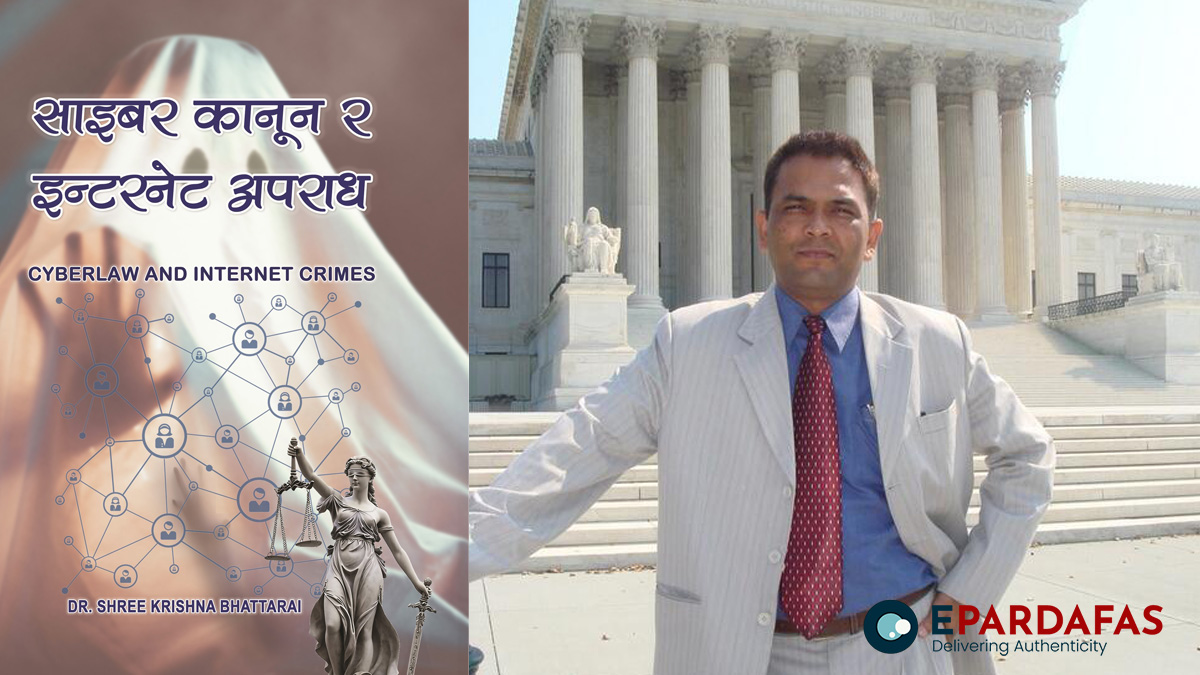
Navigating the Digital Age: A Review of Dr. Shree Krishna Bhattarai’s Pioneering Work on Cyber Law and Internet Crimes

In an age defined by technological disruption, Dr. Shree Krishna Bhattarai’s Cyber Law and Internet Crimes emerges as a crucial text, addressing the complexities of the digital landscape and the legal challenges that accompany it. As information technology (IT) transforms industries and daily life, the book provides a timely examination of how these shifts are creating new problems that challenge traditional legal frameworks.
The book begins by exploring the sweeping changes brought about by IT, emphasizing that while the convenience of technology is undeniable, it also brings chaos that demands adaptation. Dr. Bhattarai argues that as we navigate this new digital era, we must strike a balance between leveraging technological benefits and curbing its downsides. This requires revising existing laws and possibly developing new ones to address the unique challenges posed by cyberspace.
One of the book’s central themes is the inadequacy of traditional legal measures in dealing with cyber incidents. Dr. Bhattarai critiques the Electronic Transaction Act (ETA), often used as a catch-all solution for cybercrimes in Nepal, arguing that it falls short in addressing the full spectrum of legal issues in cyberspace. He also highlights the misuse of the ETA to suppress free speech, an issue that has long been contested by advocates of freedom of expression.
Dr. Bhattarai’s extensive legal background, including his experience as a judge and his academic pursuits in the US and Australia, enriches the content of the book. He meticulously defines and describes various forms of cybercrimes, from the misuse of social networks to more complex offenses, and examines how these crimes are perceived and legally addressed in Nepal and abroad.
The book provides a comparative analysis of national and international legal approaches to cybercrimes, drawing on cases from countries like Australia, India, and the UK. One notable example is the Australian case of Heather Reid vs. Stan Dukic, where a court ordered compensation for defamation on Facebook, highlighting the evolving nature of digital law. Similarly, the Indian case Shreya Singhal vs. Union of India underscores the importance of legislative intent in internet use and its influence on constitutional rights.
Dr. Bhattarai also offers practical advice on digital safety, emphasizing the importance of reducing digital footprints, controlling GPS settings, and safeguarding personal information online. These tips are especially relevant in a time when the misuse of social networks is rampant, often leading to unintended legal consequences.
Cyber Law and Internet Crimes underlines the urgent need for capacity building in the investigation, prosecution, and adjudication of cybercrimes. Whether for legal professionals, researchers, or the general public, the book serves as a valuable resource, equipping readers with the knowledge necessary to navigate the complexities of the digital age. It lays the foundation for a new era of techno-legal governance in Nepal, a critical development as the nation grapples with the challenges posed by rapid technological advancement.
Published by the Bagmati Province Government, Ministry of Internal Affairs and Law, Communication Registrar’s Office, the book is priced at Rs 750. It is a must-read for anyone interested in understanding the evolving legal landscape surrounding digital technology and ensuring justice in the digital realm.












Comments